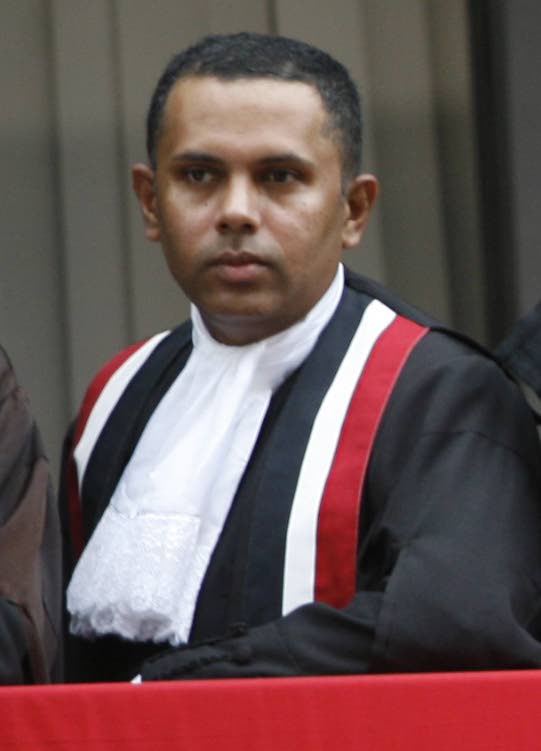State appeals judge’s decision on THA’s spending power

CAN the Tobago House of Assembly (THA) enter into special financing arrangements for its construction projects without the permission of the Minister of Finance?
According to attorneys for the State, it cannot, despite a 2014 High Court ruling which says otherwise.
The State has appealed a decision of Justice Ronnie Boodoosingh, who held that the Finance Minister’s approval was unnecessary for such financing agreements for construction projects.
Senior Counsel Alvin Fitzpatrick, who leads a team for the Attorney General, submitted that the THA could not enter into such arrangements without the approval of the minister.
He pointed to the THA Act and the powers it conferred on the assembly, which required it to send its draft estimates and expenditure for budgeting purposes for consideration and approval by the Cabinet, which will then seek parliamentary appropriations for the funds to be transferred to the THA fund.
Fitzpatrick said the THA Act created statutory control, held by central Government, of expenditure by the THA from the public purse.
He said the THA could not circumvent the provisions of the act and go ahead with expenditure without the approval of the central Government, and the assembly has autonomy, but not total autonomy, as it was the central Government to decide how public funds are to be allocated.
“The THA has autonomy to look after its affairs but it is not a sovereign body, the Central Government is…the THA is doing local administration,” he said, adding that while the THA could enter into contracts, it could not commit future expenditure without approval.
This, he said, could have serious and catastrophic repercussions, including the loss of state lands to private entities and will also result in a circumvention of the act.
He said the THA could not enter into such agreements, such as a Build, Own, Lease, Transfer (BOLT) arrangement, and commit to large payments without approval from the central Government.
“To do otherwise will be akin to the tail wagging the dog,” he said, adding, “The THA is created by statute and is limited to those powers prescribed to it under the statute.”
Presiding over the appeal are Justices of Appeal Allan Mendonca, Gregory Smith and Andre des Vignes, who have reserved their decision.
In response to the State’s contentions, lead attorney for the THA, John Jeremie, SC, argued that the only direct control the central Government has over the THA was ministerial approval for draft estimates, revenue and expenditure, and the THA Act allows it to enter into contracts.
“The assembly has the power to enter into contracts. The power to make payments after the fact…after the contracts…that must be approved, and at the end of the day a budget of estimates is sent to central Government for approval,” he said.
He also said the THA could source its own funds for projects and there was no fetter under the act to stop it entering into BOLT-type arrangements.
“I agree there exists an obligation in the future to make payments on contracts,” he said, also agreeing that it would be responsible for the assembly to hold discussions with the central Government before entering into such contracts, but added, “That does not affect its power to enter into such an agreement.”
In a cross-appeal of Boodoosingh’s ruling, Jeremie also argued that entering into a BOLT agreement with a private entity did not encroach on the powers of the Central Tenders Board (CTB).
The judge had, in his ruling, said such financing agreements for construction projects still required a compeitive tender, as prescribed under the Central Tenders Board (CTB) Act. He said the THA was not outside the purview of the legislation and could not seek unapproved ways to get around perceived inefficiencies and problems in the legislation.
At the time, the judge’s ruling came two years
after issues were raised by then prime minister Kamla Persad-Bissessar over the THA's ability to enter into a BOLT agreement for a $142 million Milshirv Administrative Complex in Shirvan, Tobago.
Boodoosingh was asked to determine, in a statutory interpretation summons, whether the THA required central Government approval before signing the contract, as well as whether such a contract needed to be awarded under the supervision of the CTB.
BOLT agreements are a non-traditional procurement method of non-debt based project financing in which a client gives permission to a private entity to build a facility on the client’s land. The client then repays the construction costs by entering into a lease with the company for renting the facility for a prescribed period. On the completion of the lease, ownership of the facility will be transferred to the client.
The
$142
million administrative complex, which boasts 83,000 square feet of floor space, was constructed under a BOLT arrangement. The Tobago House of Assembly, under Orville London's administration, bought the three-acre parcel of land, then leased the property to Milshirv Ltd at a rate of $10 annually for 199 years. Under the lease, the special-purpose company Milshirv was to build the administrative complex at an estimated cost of
$142 million and then lease/rent it to the THA at a monthly rate of $1.2 million for 20 years. At the end of the 20 years, or at three-year intervals during the period, the THA could buy and take ownership of the complex.
Milshirv currently houses the Licensing Department.


Comments
"State appeals judge’s decision on THA’s spending power"